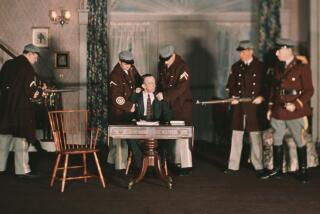With Subdued Anger, Howard Fast Still Roots for the Underdog
- Share via
Early in Howard Fast’s new novel, Abel Hunt, a chef at the poshest club in Greenwich, Conn., is moonlighting by cooking for a dinner party at the home of a wealthy couple, Richard and Sally Castle. Assisting Hunt is his teenage son, Joseph, who is about to go to Harvard. The Hunts are African American. To make sure that “a dying, corroding mass of white Protestants can depend on us to take over and run things properly”--and to show Joseph that the old man knows a thing or two himself--Hunt starts lecturing about the pilum, the ancient Roman spear “that conquered the world.”
Why the pilum? We can imagine that Fast had several things in mind. One is to show that ordinary working people can be learned as well as decent. (We take it for granted in his universe that a cook or a plumber is going to be a nicer guy than an investment banker.) Another is to nudge us into seeing parallels between imperial Rome and triumphalist America. And a third is to remind us, none too subtly, that half a century ago Fast wrote “Spartacus.”
Reading the two novels side by side gives us a sense of how his ambitions have shrunk with the eclipse of left-wing politics and his energies have dwindled with age--but also of how his fundamental sympathies are unchanged. Fast still roots for the underdog, whether it’s a nun raped by Salvadoran death squads that massacred her co-workers in 1980 or a beautiful, none-too-bright “trophy wife” who has drifted from one cruel, philandering husband to another.
The wife in question, Sally Castle, is using the party as an opportunity to confide in the nun, Sister Pat Brody, and a priest, Msgr. Donovan. She was abandoned as a baby in the San Fernando Valley and believes she might have been baptized Catholic. To her surprise, Richard doesn’t mind her inviting them. Before getting rich in the private sector, he was a State Department official in the Reagan administration who signed off on the massacre. A nice irony: Richard thinks the Catholics want to talk to him, and he wants to find out how much they know.
Also on the guest list are a novelist, Harold Sellig, and his wife, Ruth. Ruth is called away to a hospital, where her father is dying, but Harold guiltily attends the dinner because he’s eager to discuss his latest book, which is about guilt: the collective guilt of “well-to-do and comfortable people who lived orderly and lawful lives,” thanks to a political and economic system that depends on lies and violence.
Harold’s novel is called “The Assassin” and set in Greenwich, a town whose per capita wealth rivals Beverly Hills’, and, indeed, a real assassination is pending there. The target is Richard Castle. The news media, though preoccupied with “Clinton and Monica,” are finally closing in on the El Salvador story. Old CIA hands in Washington are worried that Castle will rat on them to protect himself. Their solution: Shoot him, about the same time Ruth Sellig’s father, a beloved physician, succumbs following a botched heart bypass.
“Greenwich” opens promisingly. It’s livelier than Fast’s last novel, “Redemption”; the point of view shuttles deftly among the dinner guests (including Richard’s mistress, Muffy Platt, who is the only person Sally can think of to invite to fill Ruth’s place). The chef, the nun, the monsignor, the plumber and various minor characters are well-drawn. Even the bad guys have some complexity. But when Fast gets to Castle’s killing and the subsequent cover-up, his writing turns weary and perfunctory. Spartacus isn’t about to rise again, and the energy to properly finish this story seems to have gone with him.
More to Read
Sign up for our Book Club newsletter
Get the latest news, events and more from the Los Angeles Times Book Club, and help us get L.A. reading and talking.
You may occasionally receive promotional content from the Los Angeles Times.






